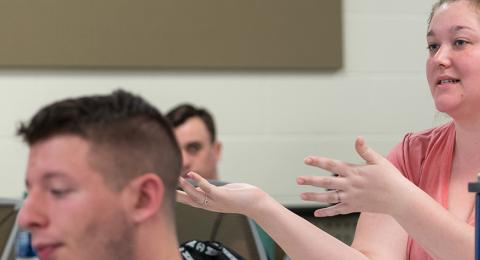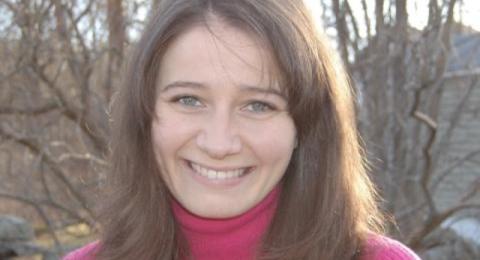The Political Science major at UNH will give you the conceptual tools to understand today's most pressing questions around topics such as, bipartisanship, systemic inequality and racism, democracy and authoritarianism. You will study power, institutions, and policy making at the local, national and global levels. Holding one of the nation's first presidential primaries makes New Hampshire an ideal place to study political science. You will gain hands-on experience through internship opportunities and competitive club activities, such as Model UN and Mock Trial.
What is political science?
Political science gives you the conceptual tools to understand pressing questions in today’s world. Why is American politics so partisan? How do we grapple with systemic inequality and racism? Why do some countries democratize and others stay locked in authoritarianism? In the political science degree program at UNH, you will study power, institutions and policy making at the local, national and global levels. From local grassroots movements to interstate wars, political action and institutions affect our societies and our everyday lives. As a major, you will study the institutions, practices and ideas that shape international, comparative and American politics.
Why study political science at UNH?
Our faculty research and teach across a wide range of topics in international and comparative politics, American politics, political theory and public administration. New Hampshire’s status as the first-in-the-nation presidential primary state makes UNH an ideal place to study political science, whether at the local or national level. In addition, you will have opportunities to participate in internships through the Concord Internship in New Hampshire’s capital or the Washington Center Internship in Washington, D.C. You can work at the UNH Survey Center and join competitive student activities such as Model UN and UNH Mock Trial.
Potential careers
- Business executive
- Civil Servant
- Counterintelligence officer
- Diplomat
- Human rights advocate
- Journalist
- Lawyer
- Nonprofit organization director
- Political strategist
- Politician
- Public relations specialist
- Think tank researcher
Curriculum & Requirements
The study of government and politics, to which the courses and seminars of the Department of Political Science are devoted, includes the development of knowledge of political behavior by individuals and groups as well as knowledge about governments: their nature and functions, their problems and behavior, and their interactions—at the national and international levels as well as local, state, and regional levels.
Much of the learning offered by the Department of Political Science can also be regarded as essential for good citizenship, since political knowledge helps to explain the formal and informal institutions by which we are governed and the forces that lead to policy decisions, and also seeks to clarify the issues and principles that encourage people toward political involvement. In addition, such learning is especially valuable to students planning to enter local or national government or other public service related fields, including the Foreign Service, and it will be of great help to those who intend to study law and enter the legal profession. For teaching, particularly at the college level, and for many types of government service, graduate work may be indispensable. An undergraduate major in political science will provide a helpful foundation for any further study of politics and related fields in the social sciences and humanities. Such an emphasis will also be valuable for students seeking careers in journalism, international organizations, and the public affairs and administrative aspects of labor, financial, and business organizations.
Sample Degree Plan
This sample degree plan serves as a general guide; students collaborate with their academic advisor to develop a personalized degree plan to meet their academic goals and program requirements.
| First Year | ||
|---|---|---|
| Fall | Credits | |
| ENGL 401 | First-Year Writing | 4 |
| POLT 401 | Politics and Society | 4 |
| Language 401 | 4 | |
| Discovery Course | 4 | |
| First Year Seminar | 1 | |
| Credits | 17 | |
| Spring | ||
| POLT 402 | American Politics and Government | 4 |
| POLT 403 | United States in World Affairs | 4 |
| Language 402 | 4 | |
| Discovery Course | 4 | |
| Credits | 16 | |
| Second Year | ||
| Fall | ||
| Subfield 1 | 4 | |
| Elective 1 | 4 | |
| Discovery Course | 4 | |
| Elective 1 | 4 | |
| Credits | 16 | |
| Spring | ||
| Subfield 2 | 4 | |
| Major Elective 1 | 4 | |
| Discovery Course | 4 | |
| Discovery Course | 4 | |
| Credits | 16 | |
| Third Year | ||
| Fall | ||
| Major Elective 2 | 4 | |
| Elective 1 | 4 | |
| Discovery Course | 4 | |
| Discovery Course | 4 | |
| Credits | 16 | |
| Spring | ||
| Subfield 3 | 4 | |
| Discovery Course | 4 | |
| Elective 1 | 4 | |
| Elective 1 | 4 | |
| Credits | 16 | |
| Fourth Year | ||
| Fall | ||
| Major Elective 3 | 4 | |
| Discovery Course | 4 | |
| Elective 1 | 4 | |
| Elective 1 | 4 | |
| Credits | 16 | |
| Spring | ||
| Major Capstone Course | 4 | |
| Elective 1 | 4 | |
| Elective 1 | 4 | |
| Elective 1 | 4 | |
| Credits | 16 | |
| Total Credits | 129 | |
- 1
Electives can be classes towards a minor, a second major, or other experiences to supplement your primary major and should be chosen in consultation with your advisor.
Degree Requirements
All Major, Option and Elective Requirements as indicated.
*Major GPA requirements as indicated.
Candidates for a degree must satisfy all of the University Discovery Program and Writing Program requirements in addition to satisfying the requirements of the major program. Bachelor of Arts candidates must also satisfy the foreign language proficiency requirement.
Major Requirements
The major in political science consists of at least 10 courses (40 credits) and not more than 12 courses (48 credits).
The minimum grade requirement is C- per course. Any grade lower than a C- will not count toward the major. The required minimum overall GPA for major coursework is 2.0.
Political Science majors may use one major-required course to satisfy one Discovery category requirement.
| Code | Title | Credits |
|---|---|---|
| Required Courses | ||
| POLT 401 | Politics and Society 1 | 4 |
| POLT 402 | American Politics and Government 1 | 4 |
| POLT 403 | United States in World Affairs 1 | 4 |
| Select Six 500-level Courses | ||
| Select three (3) subfield courses, one course from each of three different subfields below. | 12 | |
| Select three (3) elective courses from any of the five subfields below. 2 | 12 | |
Subfield: American Politics | ||
POLT 500 | American Public Policy | |
POLT 502 | State and Local Government | |
POLT 504 | American Presidency | |
POLT 505 | American Congress | |
POLT 506 | Parties, Interest Groups, and Voters | |
POLT 507 | Politics of Crime and Justice | |
POLT 508 | Supreme Court and the Constitution | |
POLT 509 | Managing Bureaucracy in America | |
POLT 511 | Women & Politics | |
POLT 512 | Public Opinion in American Politics | |
POLT 513 | Civil Rights and Liberties | |
POLT 701 | Courts and Public Policy | |
POLT 705 | Elections in the United States | |
POLT 709 | Reforming American Government | |
POLT 797B | Seminar in American Politics | |
POLT 798B | Seminar in American Politics | |
Subfield: Political Thought | ||
POLT 522 | Dissent and the Political Community | |
POLT 523 | American Political Thought | |
POLT 524 | Politics and Literature | |
POLT 584 | Selected Topics in Political Thought | |
POLT 721 | Feminist Political Theory | |
Subfield: Comparative Politics | ||
POLT 544 | Of Dictators and Democrats | |
POLT 545 | People and Politics in Asia | |
POLT 546 | Wealth and Politics in Asia | |
POLT 548 | Drug Wars | |
POLT 549 | The Politics of Markets | |
POLT 550 | Comparative Government and Society | |
POLT 551 | Ethnicity ,Violence, Democracy | |
POLT 552 | Contemporary European Politics | |
POLT 554 | Revolution and Protest in Latin America | |
POLT 556 | Politics in China | |
POLT 559 | Comparative Politics of the Middle East | |
POLT 740 | States and Societies in the Middle East | |
POLT 742 | Beyond Bollywood: Politics of India & South Asia | |
POLT 748 | Food and Wine Politics | |
POLT 751 | Comparative Environmental Politics and Policy | |
POLT 797C | Seminar in Comparative Politics | |
Subfield: International Politics | ||
POLT 560 | World Politics | |
POLT 562 | Strategy and National Security Policy | |
POLT 566 | International Security in Asia | |
POLT 568 | International Security | |
POLT 569 | The Rise of China | |
POLT 592 | Selected Topics in International Politics | |
POLT 760 | Theories of International Relations | |
POLT 762 | International Political Economy | |
POLT 778 | International Organization | |
POLT 797E | Seminar in International Politics | |
Subfield: Methods | ||
POLT 595 | Smart Politics | |
POLT 700 | Political Science Pro-Seminar | |
| Discovery Program Capstone | ||
| Select one 700-level POLT course | 4 | |
| Total Credits | 40 | |
- 1
Once students declare the major, POLT 401, POLT 402, POLT 403 must be completed within the first calendar year.
Note: POLT 440A, POLT 444, POLT 444B do not count toward the major.- 2
Students can take any POLT course at the intermediate level or higher (500-799) to count toward elective credit.
ECON 402 or ECON 605 and ECON 401 or ECON 611 may also be used to fulfill the fifth or sixth elective in this sequence. Additional economics courses will be considered by petition. Only one economics course can count toward this requirement. If students substitute an economics course for a POLT 500-level course, the economics course cannot be used to satisfy Discovery Program category requirements.
Program Learning Outcomes
- Knowledge Base: a proficient knowledge base of the five subfields of Political Science including American Government, Political Theory, Comparative Politics, International Relations, and Methods. Areas of strength include the study of public opinion, comparative politics and international relations, political economy, environmental politics, Latin American politics, Middle Eastern politics, and Asian politics. In this regard, the program fosters the development of a strong empirical foundation through multiple levels of courses.
- Research Skills: A second goal is to advance the students’ abilities to understand and use basic political science research skills. These include computer literacy, knowledge of credible sources of information, basic statistical applications, and support for foreign language proficiency. We also strive to help students identify interesting and important research questions clearly and concisely, gather and assess various types of information, and come to well-reasoned conclusions.
- Critical Thinking: The third objective involves enhancement of student cognitive abilities and critical thinking. We hone the ability to analyze, assess, and reconstruct findings in written, oral, and graphical form. We strive to promote students who are self-disciplined thinkers who understand the rigorous standards of research, are intelligent consumers of political information, and are able to understand and weigh multiple perspectives and interpretations.
- Communication Skills: Another aim is to enhance the written and oral communication skills of our students. We support the goals of the writing intensive requirement and expose students to different genres and conventions in academic writing. Most 500 and 700-level courses emphasize cultivating strong writing and reading skills, while at the 700-level, student engagement in sustained discussion becomes the centerpiece of instruction in many seminars. Writing instruction includes emphasis not only on research papers but on short analytical essays, précis, and reviews that ask students to synthesize complex information, develop arguments, and delve more deeply into interpretation. In some courses, part of this work includes iterated practice of grammar and stylistic choices through revision and proposal assignments.
- Professional Socialization and Support for Post-Graduate Training and Placement: The sixth aim of the program is to give students the requisite skills, preparation and knowledge base to become capable and responsible political actors in their chosen professional careers and future goals. We expect our students to be exposed to the ethics and organizational culture of political science specifically and the social sciences generally. We aim to provide a foundation of professionalism for students who enter both the private and public sectors upon graduation and for those who continue their studies beyond the B.A.
- Inspire Curiosity and Enthusiasm for Inquiry: A final goal is to foster a spirit of inquiry. Faculty in the Department hope to stimulate curiosity about the political world and inspire life-long learners who are engaged in the political process at the local, national and global levels.
Explore Program Details
The Accelerated Master’s Program offers a unique opportunity for students to receive a BA and MA in 5 years. For complete details, including eligibility requirements and application instructions, please visit: POLitical science Accelerated Master's Degree









